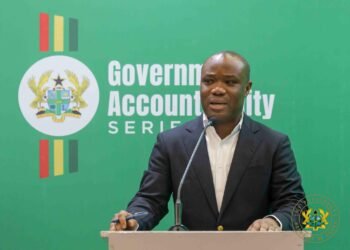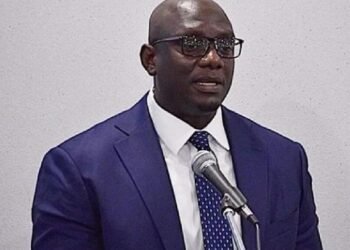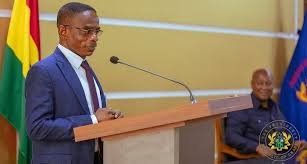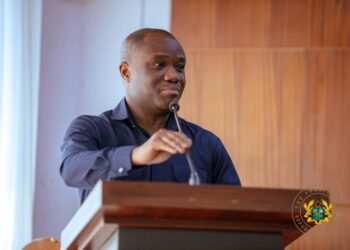The Trade Union Congress (TUC) of Ghana has intensified calls on the government to immediately address the country’s rising debt crisis, warning that workers will not sit back as the nation’s resources are drained by unsustainable borrowing.
Ghana’s total debt now stands at over GHS 800 billion, a situation the union insists is undermining development and crippling the provision of essential infrastructure. At a petition presentation to the African Continental Free Trade Area (AfCFTA) Secretariat in Accra, TUC Secretary-General Joshua Ansah warned of possible action if nothing is done.
“Today, we want to announce our pressings to the government of Ghana through AfCFTA that if nothing is done about our debts, which are denying us better schools, better hospitals, and so many amenities, Ghanaians are going to advise ourselves.
“We are here just to present our petition to the trade so that they can also see what the unions are after in Africa”
Joshua Ansah, TUC Secretary-General
Ansah explained that the petition was not only a domestic issue but also part of a broader continental agenda. Receiving the petition on behalf of AfCFTA, Albert Kan-Dapaah Jnr, Senior Advisor to the Secretary General, assured that it would be delivered to the relevant offices for consideration.

The petition coincided with the launch of the Pan-African Debt Cancellation Rally and Trade Justice Campaign, which began at the Obra Spot in Accra the same day. The rally attracted workers, trade unionists, and activists from across the continent, united in their demand for the cancellation of Africa’s unsustainable debt and for reforms to international lending practices.
Organised by the African Regional Organisation of the International Trade Union Confederation (ITUC-Africa) in partnership with the Ghana TUC, the rally highlighted the devastating impact of unfair loan agreements on development.
Organisers noted that debt repayments have “crippled public spending on education, healthcare, and job creation,” worsening socio-economic inequalities. They argued that unfair credit facilities have trapped African nations in cycles of dependency, undermining their ability to invest in growth and social justice.
The campaign, therefore, called for a new financial framework that places the needs of workers and vulnerable communities above debt servicing.
Continental Push for Financial Justice
The rally was also aligned with Africa’s broader civil society movement, particularly the “Stop Bleeding Consortium,” which is working to push governments and lenders toward reparative financial justice.

This effort is tied to the African Union’s 2025 theme on Reparative Justice for Africa and Peoples of African Descent. According to organisers, Africa’s debt must be understood within a colonial and neo-colonial context. They pointed to the May 2025 African Union Summit in Lomé, which declared Africa’s current debt burden as “odious” and called for its total cancellation.
Recent data illustrates the depth of the crisis. Africa’s sovereign debt reached US$2.14 trillion in 2024, with 22 countries considered at high risk of debt distress. Alarmingly, at least seven African nations are currently spending more on “servicing interest than on health and education combined.”
The rally in Accra was not only about debt but also about fair trade practices under AfCFTA. More than half of participating unions warned that without enforceable labour and social protections, Africa risks repeating old patterns of exploitation under the new trade framework.
ITUC stressed that trade must deliver more than GDP growth. Organisers emphasised that policies must prioritise decent jobs, workers’ rights, and long-term development.

A powerful coalition of civil society organisations also joined the demonstration, including AFRODAD, FEMNET, Pan African Lawyers, and the Tax Justice Network. Together, they rallied under the banner “Stop Bleeding Africa,” urging both governments and international financial institutions to renegotiate unfair credit agreements and commit to worker-centered development policies.
The TUC’s petition and the rally’s calls amplify a growing continental demand for debt relief and financial justice.
Ghana’s labour movement insists that without urgent interventions, both from government and international partners, the future of workers and the nation’s development agenda will remain jeopardised.
READ ALSO: Trump Revokes Kamala Harris’ Secret Service Protection























